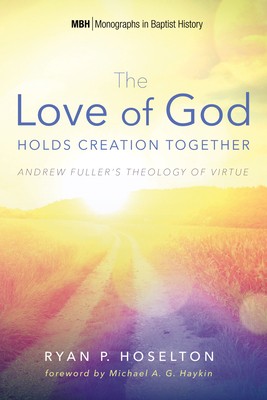
- We will send in 10–14 business days.
- Author: Ryan P Hoselton
- Publisher: Pickwick Publications
- Year: 2018
- Pages: 118
- ISBN-10: 1498244289
- ISBN-13: 9781498244282
- Format: 15.2 x 22.9 x 0.8 cm, hardcover
- Language: English
- SAVE -10% with code: EXTRA
Reviews
Description
The English Baptist Andrew Fuller (1754-1815) is well-known today for his nuanced Evangelical answer to the ""Modern Question"" against hyper-Calvinism, founding and leading the Baptist Missionary Society, and his exemplary pastoral ministry. In his day, however, he was also esteemed as a formidable apologist for Christian orthodoxy, especially in the area of moral reasoning. Following in the footsteps of his theological mentor, Jonathan Edwards, Fuller labored to defend the moral goodness and salutary nature of Christian doctrine against the new moral philosophy of the Enlightenment. As optimism in the moral potential of human nature waxed, reliance on God for truth and virtue waned. Echoing a long tradition of classical theologians, Fuller wished to declare afresh that the love of God, as manifested in the gospel, furnished humankind's only hope for virtue, excellence, and happiness. In this concise study, Hoselton looks to recover the importance of ethical reasoning in Fuller's theology and ministry and reflect on its merit for today. ""This new study of Andrew Fuller's theology of virtue is both a helpful contribution to the field and a needed pastoral reminder. Fuller challenged key heresies of his day by advocating a view of the Christian life that seamlessly wed sound doctrine and Christian virtue. For Fuller, these themes came together in an Edwardsean version of evangelical Calvinism. Evangelicals need more of this sort of pastoral theology today, and Fuller offers a fine role model for how to do it well."" --Nathan A. Finn, Dean, School of Theology and Missions, Union University Ryan P. Hoselton is an instructor and doctoral candidate in church history at Ruprecht-Karls-Universitat Heidelberg in Germany, and a Junior Fellow of The Andrew Fuller Center for Baptist Studies.
EXTRA 10 % discount with code: EXTRA
The promotion ends in 18d.09:43:20
The discount code is valid when purchasing from 10 €. Discounts do not stack.
- Author: Ryan P Hoselton
- Publisher: Pickwick Publications
- Year: 2018
- Pages: 118
- ISBN-10: 1498244289
- ISBN-13: 9781498244282
- Format: 15.2 x 22.9 x 0.8 cm, hardcover
- Language: English English
The English Baptist Andrew Fuller (1754-1815) is well-known today for his nuanced Evangelical answer to the ""Modern Question"" against hyper-Calvinism, founding and leading the Baptist Missionary Society, and his exemplary pastoral ministry. In his day, however, he was also esteemed as a formidable apologist for Christian orthodoxy, especially in the area of moral reasoning. Following in the footsteps of his theological mentor, Jonathan Edwards, Fuller labored to defend the moral goodness and salutary nature of Christian doctrine against the new moral philosophy of the Enlightenment. As optimism in the moral potential of human nature waxed, reliance on God for truth and virtue waned. Echoing a long tradition of classical theologians, Fuller wished to declare afresh that the love of God, as manifested in the gospel, furnished humankind's only hope for virtue, excellence, and happiness. In this concise study, Hoselton looks to recover the importance of ethical reasoning in Fuller's theology and ministry and reflect on its merit for today. ""This new study of Andrew Fuller's theology of virtue is both a helpful contribution to the field and a needed pastoral reminder. Fuller challenged key heresies of his day by advocating a view of the Christian life that seamlessly wed sound doctrine and Christian virtue. For Fuller, these themes came together in an Edwardsean version of evangelical Calvinism. Evangelicals need more of this sort of pastoral theology today, and Fuller offers a fine role model for how to do it well."" --Nathan A. Finn, Dean, School of Theology and Missions, Union University Ryan P. Hoselton is an instructor and doctoral candidate in church history at Ruprecht-Karls-Universitat Heidelberg in Germany, and a Junior Fellow of The Andrew Fuller Center for Baptist Studies.


Reviews